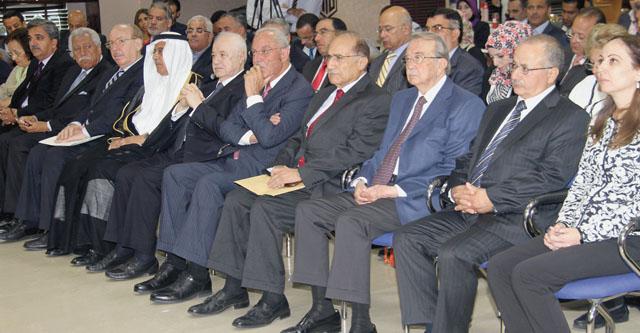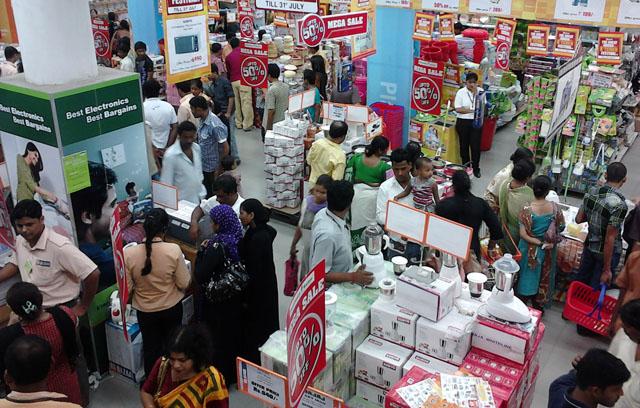You are here
Experts eye new channels to raise inter-Arab trade
By Dana Al Emam - Aug 10,2014 - Last updated at Aug 10,2014

AMMAN — Advancement in technology and means of transportation should be exploited to achieve Arab economic integration and enhance the efficiency of inter-Arab trade, experts told a conference on Sunday.
Dubbed "The Cost of Inter-Arab Trade Conference", participants also proposed that Arab countries alter regulations on trade and commerce to facilitate the transportation of goods and capitals across the region's borders.
Held at the Talal Abu-Ghazaleh Forum, in cooperation with the Economic Policy Development Forum (EPDF) and the League of Arab States (LAS), the conference was based on a study conducted by experts at Talal Abu-Ghazaleh Consulting.
LAS Economic and Social Council Assistant Secretary General Mohammad Tuwaijri, told the opening session that the council was able to reduce customs tariffs in 2005 and create a legal base for a modern trade system that corresponds with that of the World Trade Organisation (WTO).
"The Economic and Social Council cancelled previous bilateral trade agreements between Arab countries and created a collective agreement that binds all league members instead," he said, noting that the agreement takes into consideration the particularity of each country when it comes to economic advancement and financial abilities.
"The council aims to boost the quality and competitiveness of products," he added, stressing the importance of partnership with the private sector besides the diversification of products and markets.
Tuwaijri emphasised the need to increase inter-Arab trade from the current level of 10 per cent to over 50 per cent.
Industry and Trade Minister Hatem Halawani said the region's potentials must be utilised to better serve the Arab nation.
"The Arab world, which represents 10 per cent of the world's area, is rich in natural and human resources," he said, indicating that the Arab population exceeds 350 million, and the workforce comprises 112 million individuals approximately.
"The Arab world possesses over 59 per cent of the world's proven oil reserves, and 29 per cent of the world's proven gas reserves," he added.
Halawani called for creating an Arab common market that guarantees free movement of labourers, capital and means of production, stressing the need for a fiscal union that would involve monetary policies and currencies between Arab countries.
The minister attributed the weakness of inter-Arab trade to the region's political developments, in addition to delays in implementing trade agreements and decisions.
He highlighted Jordan’s success in improving economic indices.
"The Kingdom's economic reform strategy, which started five years ago, registered a positive economic growth that helped Jordan overcome an economically critical stage," he said.
The government's reserves reached $14 billion by the end of May this year after they stood at $6 billion in 2012, according to Halawani, who added that the Kingdom registered in 2013 real growth in gross domestic product that reached JD24 billion, compared to JD22 billion in 2012.
EPDF Chairman Talal Abu Ghazaleh described the conference as an achievement resulting from cooperation with the LAS, noting that others are to unfold in the future.
He said that efforts to include the league in the WTO as an observing member are still under way.
"Our partnership with LAS will create an Arab coalition for trading services, since trading should not be exclusive to goods," he told the audience, noting that the coalition is to be located in Lebanon.
Based on a suggestion from the league, the EPDF is to advise economic administrative bodies in Palestine, Sudan and Yemen to help these countries develop economically.
"We are working together on a project for the accreditation of the Arabic language as an official language for the WTO," he concluded.
Related Articles
Jordan on Sunday underlined the significance of speeding up efforts for formulating an Arab Customs Union to boost inter-Arab trade.
AMMAN — Further trade facilitations are crucial for uplifting the efficiency of inter-Arab trade, experts said Wednesday.Speaking at the Fif
AMMAN — The Amman-based Federation of Arab Businessmen (FAB) has welcomed the outcomes the Gulf summit held in Saudi Arabia and its emphasis

















